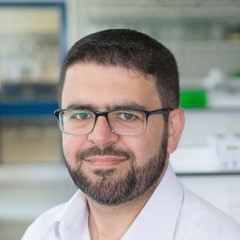
Dr Anastasios Tsaousis
About
My name is Dr. Anastasios Tsaousis and I am the Principal Investigator of the Laboratory of Molecular and Evolutionary Parasitology at the School of Biosciences at the University of Kent. The current research of my laboratory is focused on the investigations of the adaptations of microbial eukaryotic organisms, and their course in parasitic evolution and diversity. To accomplish this, my laboratory is combining detailed bioinformatics analyses of newly generated omics results with field (epediomological), cell biological and biochemical methods to address questions in regards to the role(s) of parasites in human and animal health and disease.
View Anastasios’ full academic profile here.
Research interests
GCRF-related research interests:
My laboratory is actively collaborating with various DAC countries including Bangladesh, Thailand and Algeria to investigate the role and prevalence of infectious causative agents in human and animal populations. For instance, we are currently investigating the diversity, spread and prevention of diarrhoeal pathogens in vulnerable populations in developing countries in order to develop tools and policies for eliminating the spread of diarrhoeal pathogens.
The GCRF challenge areas addressed in my research:
My research and expertise fits under the umbrella of “Equitable Access to Sustainable Development” and especially to create new knowledge and drive innovation that helps to ensure that everyone across the globe has access to: secure and resilient food systems supported by sustainable marine resources and agriculture; sustainable health and well being; and clean air, water and sanitation. My research interests align with the aforementioned areas, since we are aiming to tackle major issues that affect both the human health and also the agriculture, but finding innovating solutions to prevent infectious diseases (e.g. diarrhoeal) outbreaks.
My research interests and expertise cut across different UN SGDs:
SDG3 – Global Health & Wellbeing: “Ensuring healthy lives and promoting the well-being for all at all ages is essential to sustainable development.” My research goals are to develop safe, affordable, and effective methods for preventing and eradicating the leading causes of diarrheal and enteric diseases in low- and lower-middle-income countries.
SDG6 – Clean Water and Sanitation: “Clean, accessible water is an essential part of the world we want to live in”. Children living in densely populated, poor, urban areas with inadequate water and sanitation infrastructure suffer the highest rates of diarrhoeal diseases. Providing ways of eradication and strategies to eliminate contamination of this source, including improvements in water sanitation and hygiene in the long term can significantly reduce both suffering and death from these diseases.
The DAC-list countries benefitting from my research:
The primary impact of my research findings will be in Bangladesh and Thailand, two countries on the DAC list, but the long-term research findings will be of direct use to other countries on the DAC list.
Supervision
I would be interested in supervising any GCRF-related research projects on infectious and/or genetic diseases.